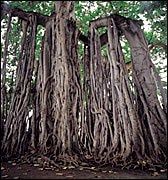The most important relationship I seek to nurture in the treatment room is the one a patient has with their own body. We live in a culture that teaches us to override pain, defer to outside authority, and push through discomfort. Patients often arrive hoping I can “fix” them, but the truth is, we can’t do the work for them. We can offer guidance, insight and support, but healing requires their full participation.
Herbs & Botanicals
Eucalyptus (eucalyptus globulus)
What is eucalyptus? What is it used for?
Eucalyptus is a type of evergreen tree which is native to Australia, but now grows worldwide. There are more than 300 known species of eucalyptus, the most common of which are E. globulus and E. fructicetorum. The tree's leaves - along with an oil derived from the leaves - are used in herbal preparations.
Eucalyptus has been used for centuries to treat fevers and help sterilize wounds. The main ingredient in eucalyptus leaves is eucalyptol, a volatile oil that fights infections and has expectorant properties. As such, eucalyptus oil is employed in the treatment of a vast number of ailments, ranging from bronchitis and asthma to emphysema and chronic snoring. Test-tube research has also shown that eucalyptus fights bacteria such as bacillus subtilis, and several forms of the streptococcus bacteria. This research has yet to be conducted in humans, however. Eucalyptus is also used as an insect repellant in many countries.
How much eucalyptus should I take?
 The amount and type of eucalyptus to be taken depends on the condition being treated. Generally, no more than 0.05-0.2 milliliters of eucalyptus oil per day can be taken internally, diluted in warm water. The oil can also be added to hot water or vaporizers as an inhalant. In addition, eucalpytus oil can be applied to the skin to relieve minor muscle pain. A tea can be made by taking between 2 and 3 grams of chopped eucalyptus leaves and steeping them in boiling water.
The amount and type of eucalyptus to be taken depends on the condition being treated. Generally, no more than 0.05-0.2 milliliters of eucalyptus oil per day can be taken internally, diluted in warm water. The oil can also be added to hot water or vaporizers as an inhalant. In addition, eucalpytus oil can be applied to the skin to relieve minor muscle pain. A tea can be made by taking between 2 and 3 grams of chopped eucalyptus leaves and steeping them in boiling water.
What forms of eucalyptus are available?
Whole, dried eucalyptus leaves can be found at some herbal shops. Many health food stores and nutrition centers sell eucalyptus oils and extracts.
What can happen if I take too much eucalyptus? Are there any interactions I should be aware of? What precautions should I take?
Eucalyptus should only be used with extreme caution. Internal use can cause nausea, vomiting and diarrhea; large amounts can be fatal. It should not be used by infants and children under the age of two, and should not be taken by women who are pregnant or breastfeeding. The oil may also aggravate bronchial spasms in people with asthma. The American Herbal Products Association has given eucalyptus a class 2D rating; should not be taken internally by people with liver disease or inflammatory disorders of the gastrointestinal tract and kidneys, and should not be applied to face or nose of young children or infants.
Because eucalyptus oil may activate certain enzymes in the liver, it may reduce the effectiveness of some medications, including pentobarbital and aminopyrine. Patients taking these and other medications should avoid eucalyptus products until they consult with a licensed health care provider. As always, make sure to consult with a licensed health care practitioner before taking eucalyptus or any other herbal remedy or dietary supplement.
References
- Blumenthal M, Busse WR, Goldberg A, et al. (eds). The Complete German Commission E Monographs: Therapeutic Guide to Herbal Medicines. Austin, TX: American Botanical Council and Boston: Integrative Medicine Communications, 1998, pp. 127-8.
- Brinker F. Herb Contraindications and Drug Interactions. Sandy, OR: Eclectic Institute Publishers, 1997, pp. 46-7.
- Leung AY, Foster S. Encyclopedia of Common Natural Ingredients Used in Food, Drugs, and Cosmetics, 2d ed. New York: John Wiley & Sons, 1996, pp. 232-3.
- McGuffin M, Hobbs C, Upton R, et al. (eds.) American Herbal Products Association's Botanical Safety Handbook. Boca Raton, FL; CRC Press, 1997, p. 49.
- Trigg JK, Hill N. Laboratory evaluation of a eucalyptus-based insect repellent against four biting arthropods. Phytother Res 1996;10:313-6.


